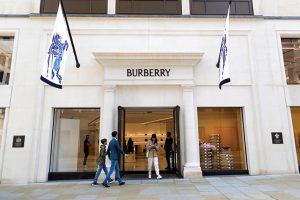BLOOMBERG
Burberry Group Plc slumped after the UK trenchcoat maker slashed its profit forecast, a fresh sign that demand for luxury goods, particularly in the US, is waning. The British retailer wiped nearly £100 million ($128 million) off its profit outlook in the starkest sign yet that after an unprecedented surge in luxury sales during the pandemic, the bubble has burst. The stock fell as much as 15% in London, the steepest intraday decline in more than a decade.
Burberry is one of the weaker luxury brands in the midst of a turnaround but Chief Executive Officer Jonathan Akeroyd said it was clear that demand for luxury goods was falling. Most every region the company, known for its tartan scarves, operates in was weaker, he said, including the key US and China territories, indicating 2024 could be a very tough year for the sector.
The downgrade comes after bigger rivals Richemont, LVMH and Kering SA have also reported weaker demand. Burberry’s warning triggered a selloff among those peers, wiping out as much as $7 billion from the sector.
Turnaround Effort
Burberry has been trying to revive its performance in the past few years, elevating its brand and prices points but this makes it especially sensitive to weak demand. Akeroyd’s efforts to jumpstart the brand have been stymied so far. The warning is bad news for the sector, though Burberry is a special case, as the company is struggling to create more buzz. In November, Burberry warned sales were barely growing and said its profit would probably come in at the lower end of its guided range. Last week, it showed that trading was even more difficult than expected, led by a 15% slump in revenue from the Americas.
Akeroyd has appointed designer Daniel Lee to reinvigorate the company’s popularity, but the efforts have yet to bear fruit. Consumers have had a muted reaction to Lee’s creations, UBS analyst Zuzanna Pusz wrote in a note in early October, adding there’s a lack of hype on social media for the brand. The shares lost almost a third of their value last year.
Adjusted operating profit should be £410 million to £460 million in the year through March, Burberry said in the unscheduled trading update. Burberry previously forecast earnings of as much as £668 million.
In the past few quarters, shoppers worldwide have been balking at higher prices from luxury brands, signalling that inflation is also hitting well-heeled shoppers, especially so-called aspirational customers who tend to buy items at the lowest price levels. Akeroyd said the slowdown was now hitting a broader customer base.
In November, Richemont reported a surprise decline in earnings as revenue from luxury watches unexpectedly fell and high-end consumers reined in spending.
Weaker Outlook
Analysts at UBS Group AG said this month they expect a weak luxury-goods earnings season, advising investors to stick to more defensive stocks such as Hermes International SCA and avoid Burberry, as its turnaround is not yet proven. The consultancy Bain estimates the industry will grow by as much as 4% this year in its most probable scenario, down from 8% in 2023, underlining the challenges facing high-end companies. LVMH Moet Hennessy Louis Vuitton SE, the industry leader, reports annual sales and earnings on January 25.
Burberry’s wholesale revenue has been suffering as its price points are too high for some customers. The retailer is also very reliant on Chinese shoppers and it has taken time for mainland tourists to start returning to Europe since the pandemic. Akeroyd said the flow of Chinese tourists in European capitals remains below pre-pandemic levels. In its home market of the UK, Burberry, like other luxury rivals, has been affected by the UK government’s decision to scrap VAT-free shopping for travellers, meaning some tourists are now buying their high-end goods in places like Paris and Milan rather than London.
 The Gulf Time Newspaper One of the finest business newspapers in the UAE brought to you by our professional writers and editors.
The Gulf Time Newspaper One of the finest business newspapers in the UAE brought to you by our professional writers and editors.
